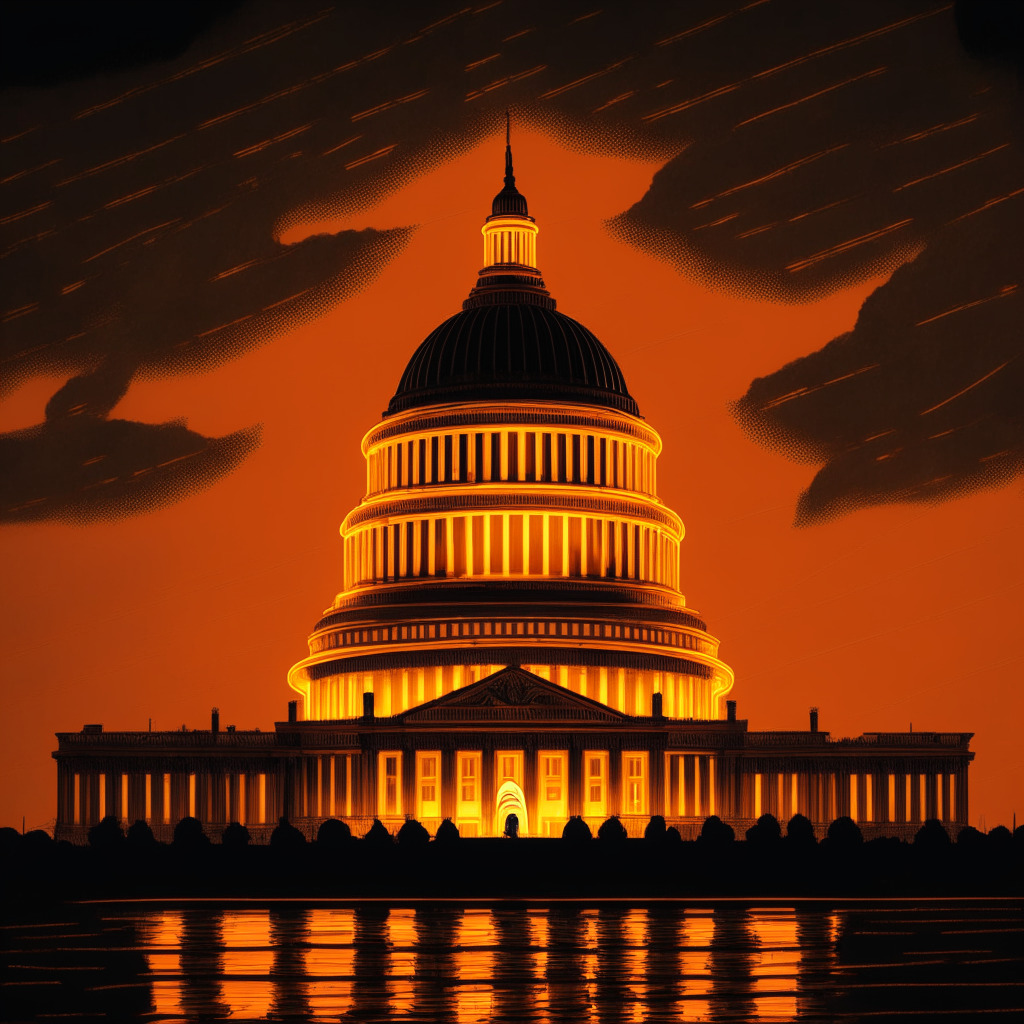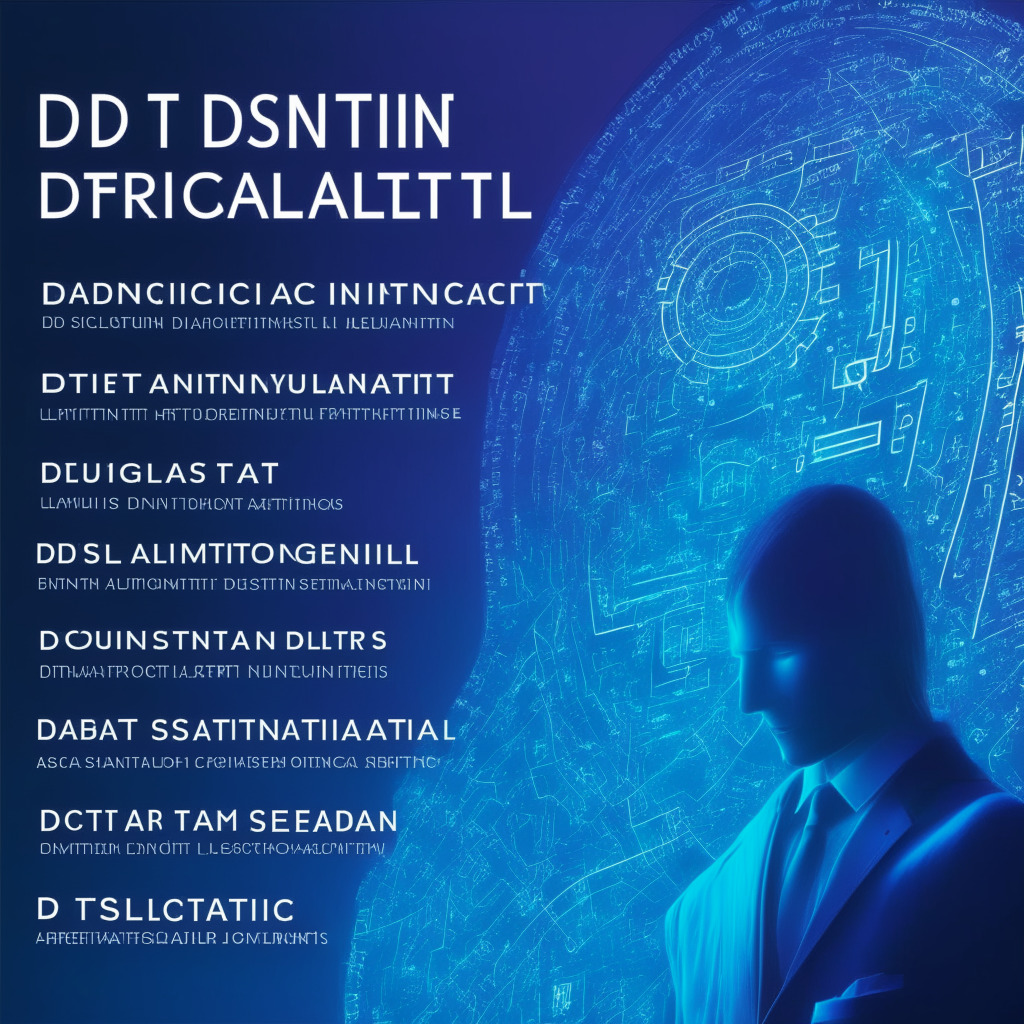A potential US government shutdown could significantly impact digital assets and crypto-related legislation. Regulatory operations could stall, bills beneficial to digital assets may hit roadblocks, and key financial regulators would operate with limited enforcement and oversight capabilities. Blockchain regulations may be deprioritized amid other post-shutdown concerns.
Search Results for: US Treasury Department
Decoding the Maze: Blockchain Finance, Sanctions and the Eternal Cat-and-Mouse Game
The US Department of Treasury has imposed sanctions on an Ethereum-backed cryptocurrency wallet linked to an international drug trafficking organization, highlighting renewed governmental attention towards illicit activities facilitated via blockchain. This saga exposes pitfalls and successes in the fight for blockchain transparency and safety.
PayPal’s Venmo and the Stalled Adoption of PYUSD Stablecoin: Analysis and Future Implications
“PayPal’s mobile payment platform, Venmo, has begun offering its Ethereum-based stablecoin, PYUSD, marking a significant step toward integrating cryptocurrency with mainstream finance. Despite its robust structure and support, PYUSD’s adoption has been slow, likely due to competition and regulatory contradictions.”
Inflation Surge: Decoding the Impact of Rising Housing and Energy Costs on the US Economy
The U.S. saw a 0.6% increase in its consumer price index (CPI) in August, the biggest growth in inflation in 2021, leading to a 3.7% year-over-year rise. Significant factors contributing to this include energy prices, food prices and notably, a 0.3% increase in housing costs, which makes up about a third of the CPI’s weight.
North Korean Lazarus Group’s $41M Crypto Casino Heist: A Detailed Examination
The FBI has identified North Korean hacking group, the Lazarus Group, as responsible for the theft of $41 million from online crypto casino Stake. The large-scale cyber theft affected multiple blockchain networks including Ethereum, BNB Chain, Bitcoin, and Polygon.
Binance Quietly Removes Banco de Venezuela: Blockchain Freedom Versus Economic Sanctions
Cryptocurrency exchange Binance has silently removed Banco de Venezuela from its P2P service list, mirroring U.S Treasury-imposed financial sanctions. The move raises concerns among Venezuelan crypto enthusiasts, notably because the bank plays a crucial role in Venezuela’s digital currency ecosystem. Despite the silent removal, users can reportedly circumnavigate the ban due to the P2P nature of the services.
Navigating the Tides: US Treasury’s Proposed Crypto Regulations Stir Debate
The US Treasury and IRS propose new regulations making digital asset brokers accountable for reporting certain sales and exchanges. This move aims to simplify tax calculations, bring digital asset tax reporting on par with securities, and prevent tax evasion. Critics, however, see this as an attempt at excessive government control, potentially stifling the growth of decentralization and web3 adoption.
Navigating the Storm: Treasury’s Proposed Crypto Tax Rules Stir Controversy and Promise
The U.S. Treasury Department’s proposed digital assets tax rules have sparked controversy within the crypto community. The debate revolves around the feasibility of regulating decentralized operations and potential implications for wallet vendors, decentralized exchanges, and smart contract systems. Nonetheless, a clear taxation path might facilitate easier engagement with digital assets.
Blockchain regulation: A deep dive into the Tornado Cash vs Treasury case and its implications
“The case underscores a delicate dynamic in the blockchain world – the continuous tussle between freedom and control, between decentralized finance and government intervention, each with weighty implications on the other. This case symbolizes a battle of principles, signaling a profound shift in the future of blockchain technology.”
Clash of the Titans: Crypto Community vs U.S. Treasury in Tackling Anonymity and Regulation
“Regulation in the crypto world came under scrutiny after a lawsuit backed by Coinbase challenged the U.S. Treasury Department’s sanctions on Tornado Cash, a crypto transaction platform. Despite uproar from the crypto community, a judge ruled that the Treasury acted within its powers, escalating the ongoing tension between crypto advocates and regulatory bodies.”
Closing the $50 billion Crypto Tax Gap: Urgent Measures or Rushed Consequences?
Democratic Senators, including Elizabeth Warren and Bernie Sanders, urged the IRS and the Treasury Department to expedite new crypto tax regulations to close a potential “$50 billion crypto tax gap.” They expressed concerns about potential loss of $1.5 billion in government tax revenue for 2024 due to delay in the implementation. This is amid a wider conversation for more transparency in the bourgeoning cryptocurrency sector.
US Crypto Regulation: A Patchy Landscape and the Urgent Need for Unified Oversight
“A recent report by the United States Government Accountability Office (GAO) shows significant regulatory gaps in the crypto assets market. It highlights the need for unified coordination to counter blockchain risks and establish a timely response system. Particularly, the report emphasizes rising concerns around stablecoins and decentralized finance’s escalating risks to the crypto and macro economy.”
How Treasury Bill Issuance Affects Crypto and Stocks: Dissecting Arthur Hayes’ Bullish Outlook
The US Treasury Department’s TGA refill has not significantly impacted risk markets, says BitMEX co-founder Arthur Hayes. He remains bullish on Bitcoin and believes a price rally will come, as net liquidity index remains positive and the debt ceiling deal hasn’t severely affected financial markets or US dollar liquidity.
US CBDC Dilemma: Balancing Privacy, Security, and Financial Inclusion in a Digital Era
The Treasury Department leads an interagency working group studying a potential U.S. central bank digital currency (CBDC). As digital currencies gain traction, finding a balance between innovation, trust, protection, privacy, and financial inclusion is crucial for the nation’s digital financial future.
Balancing Privacy and Transparency: Pros and Cons of a US Central Bank Digital Currency
The U.S. Treasury Department explores Privacy Enhancing Technologies (PETs) to protect privacy and anonymity in potential digital dollar transactions. As the U.S. considers introducing a Central Bank Digital Currency (CBDC), addressing risks and striking a balance between privacy and transparency remain top priorities for policymakers.
Blockchain Revolution in Banking Meets AI-Generated Fraud: Unleashing Potential or Unraveling Trust?
JPMorgan collaborates with six Indian banks to enable real-time interbank dollar settlements on its blockchain-based platform, Onyx. However, concerns emerge over AI-generated fraud in the crypto and blockchain sectors. Meanwhile, the UK’s APPG proposes recommendations for crypto regulation, and the US Treasury Department’s sanctions on Tornado Cash face legal challenges.
Impact of $173B Treasury Bills Auction on Crypto Market: Risks and Opportunities Explained
The U.S. Treasury Department’s $173 billion Treasury bills auction could drain U.S. dollar liquidity from the financial market and increase selling pressure on the crypto market, including Bitcoin. This move raises the risk of recession and may result in higher volatility and weaker returns for cryptocurrencies. However, the long-term outcome remains uncertain, as some investors may hedge against recession and inflation with digital currencies.
Crypto Market Resilience Amid US Debt Dilemma and Regulatory Challenges
Crypto market displays resilience amid regulatory challenges and US debt concerns, with experts predicting pre-FOMC market correction. Experts expect correction and consolidation between $25K-$27K levels, while the decline in bitcoin options put/call ratio indicates reduced investor concerns. Ethereum’s post-merge performance captures market attention through increased staking demand and realized deflationary promise.
Cryptocurrency and Fentanyl Crisis: Senator Warren’s Regulatory Push Amid Alarming Stats
Sen. Elizabeth Warren calls out cryptocurrency’s role in fentanyl drug transactions, highlighting her Digital Asset Anti-Money Laundering Act. Cryptocurrency enabled 90 Chinese suppliers to exchange precursor drugs, producing $54 billion worth of fentanyl pills, causing concerns over crypto’s potential to facilitate illegal activities.
IMF’s US Rate Hike Advice: The Impact on Crypto Markets and Inflation Control
The IMF advises the US Federal Reserve to maintain interest rate hikes and adopt stringent fiscal policy to minimize federal debt. The tightening of fiscal policies and potential rate hikes might impact stock and crypto markets, causing a temporary decrease in Bitcoin value.
Tornado Cash vs US Treasury: A Battle of Privacy, Sanctions, and Free Speech
The ongoing legal battle between individuals and the US Department of Treasury focuses on sanctioning Ethereum mixing service Tornado Cash. Key arguments involve adherence to the International Emergency Economic Powers Act and the First Amendment’s protection of free speech. Coinbase’s chief legal officer, Paul Grewal, claims the government is inappropriately banning open-source software.
Crypto Market Turmoil: US Debt Default Deadline, Recovery Hopes, and 2024 Watershed Moment
Cryptocurrencies like Bitcoin and Ethereum may experience massive selloffs due to the approaching US debt default deadline, predicts Blockchain.com CEO Peter Smith. However, cryptocurrencies are expected to bounce back soon after any initial impact. The ongoing debt ceiling talks have led to Bitcoin investors panicking and prices dipping, highlighting the need for market vigilance.
US Debt Ceiling Dilemma: Impact on Crypto and Stock Markets, Weighing Pros and Cons
The US debt ceiling situation may significantly impact stocks and cryptocurrency markets, with potential “catastrophic” global consequences. The outcome could lead investors to sell off stocks and cryptocurrencies and purchase high-yield Treasury bills. However, Bitcoin may rally in the coming weeks amid a weakening US dollar dominance.
White House Crypto Policies Amid Debt Ceiling Crisis: Balancing Regulation & Innovation
The White House is actively addressing cryptocurrency policy amid concerns over the debt ceiling and potential economic consequences. President Biden seeks a debt deal that doesn’t protect crypto traders and wealthy tax evaders, while the US Treasury warns of potential economic danger without an agreement. Striking a balance between regulation and innovation in crypto is crucial as investors and traders closely monitor upcoming economic events and policies.
US Debt Default and Stablecoins: How Circle Aims to Protect USDC Reserves with Repo Agreements
Circle Internet Financial is adjusting the reserves behind the $30 billion USD Coin, considering the possibility of a U.S. government debt default. BlackRock manages the Circle Reserve Fund, now incorporating $8.7 billion in overnight repo agreements as extra protection for the USDC reserve.
Stablecoin Regulation: Balancing Innovation and Consumer Protection in the US Market
California Rep. Maxine Waters has introduced a draft bill to regulate stablecoins in the United States, focusing on payment stablecoin issuers’ requirements, digital dollar research, and related subjects. Supporters say a clear regulatory framework would ensure oversight and consumer protection, while critics argue it could hinder innovation and limit the broader adoption of cryptocurrencies.
2023 Crypto Crackdown: Operation Choke Point 2.0 vs Banking Industry Collapse
The US regulators’ crackdown on the crypto market has led to the closure of Silvergate, Silicon Valley Bank, and Signature, while prominent figures criticize scapegoating cryptocurrencies for the banking crisis. The House Financial Services Committee investigates potential coordinated efforts to de-bank the crypto market as the banking crisis worsens.
IRS Hits FTX With $44 Billion Claims: Trust in Crypto Exchanges Under Fire
The United States Department of Treasury and IRS filed 45 claims amounting to $44 billion against cryptocurrency exchange FTX and its subsidiaries, related to tax liabilities for FTX’s sister company Alameda Research LLC. The recent events question trust in cryptocurrency exchanges, and highlight the importance of understanding the regulatory environment and tax implications for such platforms.
Tether’s $1.48B Q1 Profit: Can Success Amid Transparency Concerns Sustain?
Tether reported a $1.48 billion net profit in Q1 2021 and disclosed its $1.5 billion Bitcoin and $3.4 billion gold holdings. Despite scrutiny, Tether’s USDT stablecoin remains a market leader. Increased transparency efforts include reducing secured loans in reserves and providing clearer information on reserve assets.
Biden’s Blockchain Focus: Digital Identity, DLT Advancements, and Balancing Privacy
The US government has emphasized the development of critical and emerging technologies, including digital identity infrastructure and distributed ledger technologies (DLT). As blockchain gains significance in the economic landscape, challenges arise in balancing innovation and privacy, while aiming to bolster US competitiveness and maintain a secure digital environment.
The Trillion-Dollar Platinum Coin Debate: Ingenious Solution or Financial Sleight of Hand?
A potential solution to the U.S. debt default in June involves creating a $1 trillion platinum coin, exploiting a legal loophole that allows the Treasury to mint platinum coins of any value. Proponents of Modern Monetary Theory (MMT) find the idea viable, while others view it as a financial sleight of hand.
UK’s Rise as a Crypto Powerhouse: Pros, Cons, and the Future of Blockchain Technologies
The UK is emerging as a leading crypto hub with its robust financial infrastructure and supportive policymakers. London has been recognized as one of the best cities for crypto businesses, and the country’s government emphasizes the importance of a central bank digital currency and aims to lead in Web3 and metaverse advancements.































